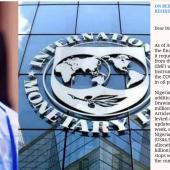According to Nigeria’s most recent data update published by the IMF on April 30, 2025, the country is expected to pay Special Drawing Rights (SDR) 22.35 million in interest and charges for 2025.
The International Monetary Fund (IMF) has confirmed that Nigeria has fully repaid the US$3.4 billion loan it received under the Rapid Financing Instrument, which was designed to mitigate the economic impact of the COVID-19 pandemic.
In an email sent exclusively to SaharaReporters on behalf of Mr. Christian Ebeke, the IMF Resident Representative for Nigeria, the Fund stated that although the principal loan has been fully repaid, Nigeria is still required to pay approximately US$30 million annually in associated charges.
“As of April 30, 2025, Nigeria has fully repaid the financial support of about US$3.4 billion it requested and received in April 2020 from the International Monetary Fund (IMF) under the Rapid Financing Instrument to help alleviate the impact of the COVID-19 pandemic and the sharp fall in oil prices,” the IMF said in its response to enquiries made by SaharaReporters.
“Nigeria is expected to honor some additional payments in the form of Special Drawing Rights charges of about US$30 million annually.
“In line with the IMF’s Articles of Agreement, these charges, levied at the SDR interest rate, which is updated at the beginning of each week, apply to the difference between Nigeria’s SDR holdings (SDR 3,164 million) (US$4.3 billion) and its cumulative SDR allocation (SDR 4,027 million) (US$5.5 billion).”
“The net payment of the charges stops when Nigeria’s SDR holdings reach the cumulative allocation amount,” the IMF added.
In an earlier report, SaharaReporters highlighted that Nigeria remains liable for annual charges to the International Monetary Fund (IMF), despite having fully repaid the principal sum of the US$3.4 billion loan obtained in April 2020.
According to Nigeria’s most recent data update published by the IMF on April 30, 2025, the country is expected to pay Special Drawing Rights (SDR) 22.35 million in interest and charges for 2025. For 2026 and 2027, the projected payments are SDR 25.91 million each year; SDR 25.92 million is expected in 2028, while SDR 25.90 million is projected for 2029.
SaharaReporters analysis, using the prevailing exchange rate of SDR1 = US$1.35, shows that the 2025 payment (SDR 22.35 million) translates to approximately US$30.17 million. For each of the years from 2026 to 2029, the payments convert to roughly US$34.9 million annually.
In total, the country is expected to pay SDR 125.99 million in charges between 2025 and 2029. While the IMF expressed these figures in US dollars in its response, the original data on its website was denominated in SDRs.
At an exchange rate of N1,609 to the dollar, the annual US$30 million charge equates to approximately N48 billion — a recurring cost to the country through 2029.
As of the time of this report, according to XE.com, one SDR equals US$1.35.
Citing figures from the Central Bank of Nigeria’s 2024 financial year report, SaharaReporters previously disclosed that the country’s debt to the IMF surged by N2.5 trillion by the end of December 2024, largely due to foreign exchange losses.
To put it simply, Nigeria’s liability to the IMF stood at approximately N2.5 trillion in 2023. However, the sharp depreciation of the Naira doubled that figure, pushing it to about N5 trillion by the end of 2024. This means that in Naira terms, the country had to pay nearly twice as much, according to the Central Bank’s financial statement.
When SaharaReporters first reported this debt increase, presidential media aides Bayo Onanuga and Dada Olusegun publicly disputed the claim. Nonetheless, the report was firmly based on official data from the Central Bank of Nigeria.
Debt servicing continues to consume a significant portion of Nigeria’s revenue. A SaharaReporters analysis of the Central Bank’s economic report for January 2025 showed that the country spent N696 billion on debt servicing that month alone. Combined with December 2024 figures, debt servicing totalled N1.3 trillion over just two months, with N696 billion spent in each.
This figure far exceeded the government’s monthly debt servicing allocation of N689 billion.
Notably, the January 2025 economic report also revealed that the government allocated zero naira for capital expenditure during that period.
Follow the Sahara Reporters channel on WhatsApp: https://whatsapp.com/channel/0029VaFClvtH5JM6SSsP7M2Y












